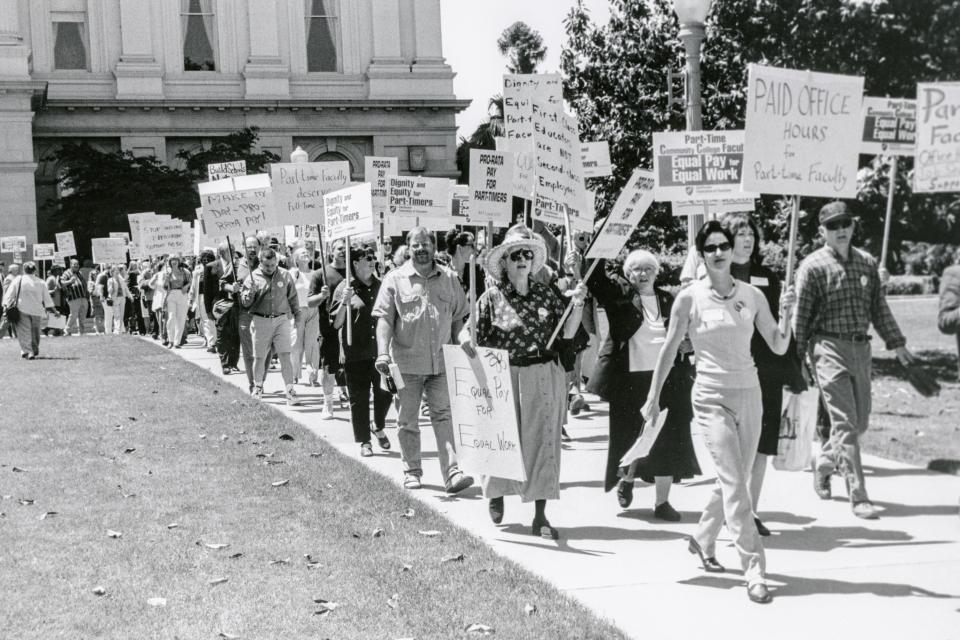Download a single-sheet illustrated history of the Community College Council
Formed in 1971, the Community College Council gave a voice to the growing numbers of CFT college faculty. Los Angeles history teacher Hy Weintraub, president of the council for much of the decade, brought a coherent statewide identity to the group.The council energetically supported the Peralta court case, filed in 1974, seeking tenure for part-time instructors and guidelines for their hiring and retention, as well as pro rata pay and benefits for part-timers, most of which the Peralta decision achieved in 1979.
In 1983, Gov. George Deukmejian cut nearly one-sixth of the community college budget. Compromises restored about half the money, but a $50 tuition was imposed on the formerly free system. CCC President Robert Gabriner led the CFT’s opposition to the tuition that caused plummeting enrollment in working class and minority districts.
By the mid-1980s the CCC had grown to a major player in the community college system. Gabriner became its first full-time paid president.
CFT heavily influenced the state review of the Master Plan for Higher Education. Community colleges gained increased funding, greater faculty involvement in governance, professional development for faculty and staff, and progress toward redressing the system-wide exploitation of part-time instructors.
In 1988, the CCC played an important role in passing AB 1725, the ground-breaking omnibus legislative package based on the Master Plan review. For the first time, a state funded enlargement of its full-time faculty by converting part-timers to full-time positions, while beginning to correct the chronic underfunding of the community colleges. Gabriner chaired the Californians for Community Colleges coalition, which steered the review’s conclusions.
Marty Hittelman, first elected CCC president in 1991, was president for 12 years in two separate terms. He concurrently served as CFT senior vice president for 17 years, and was elected CFT president in 2007.
Parity for part-time faculty has remained a defining issue. The CFT has secured legislation to improve healthcare for part-timers, fund office hours, and strengthen rehire rights. Locals have also made gains, but the battle is far from over.
In recent years, the council’s defining issue has been fair accreditation. After five years of costly court cases and legislation, City College of San Francisco was accredited for seven years after being threatened with losing accreditation. Compton College was reaccredited after 12 years. CCC President Jim Mahler played a key role in winning significant reforms of the Accrediting Commission for Community and Junior Colleges.
The CCC remains a leading advocate for community college faculty and staff in California.
SNAPSHOT: CCC Presidents
1971 Hy Weintraub, AFT College Guild
(Los Angeles)
1981 Virginia Mulrooney, AFT College
Guild
1983 Robert Gabriner, Peralta
Federation of Teachers
1991 Marty Hittelman, AFT College
Guild
1997 Tom Tyner, State Center
Federation of Teachers
2001 Marty Hittelman, AFT College
Guild
2007 Carl Friedlander, Los Angeles
College Faculty Guild
2013 Jim Mahler, AFT Guild, San Diego
and Grossmont-Cuyamaca Community Colleges

